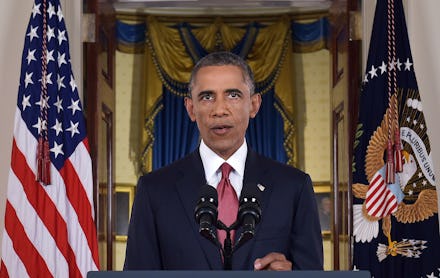Obama Issues Scathing Warning to IS: "You Will Find No Safe Haven"

Wednesday night, President Obama announced his strategy for dealing with the threat posed by Islamic State militants who have seized control of large parts of Iraq and Syria. Obama told the nation that U.S. airpower in collaboration with regional ground troops will "degrade, and ultimately destroy" IS (also known as ISIS or ISIL), while cautioning the American people to understand that the forthcoming "effort" will be "different from the wars in Iraq and Afghanistan."
The president's address comes just weeks after the brutal beheading of two American journalists, James Foley and Steven Sotloff, whose executions by IS were broadcast online as a challenge to American "arrogance." IS insurgents have repeatedly overwhelmed Iraqi, Kurdish, and moderate Syrian opposition in recent months, carving out territory to an extent that is "unmatched" in the history of modern terrorist organizations.
"This is a core principle of my presidency: if you threaten America, you will find no safe haven."
While no ground troops will be re-entering Iraq or invading Syria, the president promised a "steady, relentless effort to take out ISIL wherever they exist."
Obama's speech marks the most significant escalation of the American response to the crisis so far and will likely be remembered as the turning point in U.S. policy towards IS. Here's a point-by-point breakdown of the new U.S. strategy for dealing with IS as outlined by the commander in chief.
IS poses a threat well beyond Iraq and Syria: Though the intelligence community has no reason to believe IS is currently plotting domestic attacks in the U.S., Obama said that its militants pose a grave threat to "the broader Middle East – including American citizens, personnel and facilities. If left unchecked, these terrorists could pose a growing threat beyond that region – including to the United States ... Trained and battle-hardened, these fighters could try to return to their home countries and carry out deadly attacks," including Europeans and Americans flying the group's black flag.
The U.S. will begin airstrikes in both Iraq and Syria: Though the president did not divulge the scale of the planned American air campaign, he said that any attacks would be executed in close coordination with the Iraqi army. Obama also stated that "we will hunt down terrorists who threaten our country, wherever they are. That means I will not hesitate to take action against ISIL in Syria, as well as Iraq. This is a core principle of my presidency: if you threaten America, you will find no safe haven."
There you have it: the campaign that was originally pitched as a last-ditch stand to slow the IS advance in northern Iraq and save members of the Yazidi minority trapped in Sinjar province has now expanded into a two-theater air war.
Obama will increase aid to forces on the ground: 475 additional service members will be joining the 300 or so U.S. military advisers already on the ground in Iraq, but these troops will not be participating in active combat against Islamic State militants. They will, the president says, "support Iraqi and Kurdish forces with training, intelligence and equipment" and help organize Iraq mobilize National Guard Units from Sunni communities.
Moderate rebels in Syria — those like the Free Syrian Army who stand in opposition to both Alawite dictator Bashar al-Assad and extremist groups like IS — will now be getting increased military assistance from the U.S., although the president stressed that this aid would be a "counterweight" to IS extremists and any solution to Syria's civil war would have to be "political."
The intelligence community will step up its war on IS: The president has ordered intelligence agencies and others to "redouble our efforts to cut off its funding; improve our intelligence; strengthen our defenses; counter [IS'] warped ideology; and stem the flow of foreign fighters into – and out of – the Middle East." Additionally, Obama will chair a UN Security Council meeting in two weeks to solicit international assistance.
Finally, there will be an aggressive humanitarian aid effort: Obama said that "Sunni and Shia Muslims who are at grave risk, as well as tens of thousands of Christians and other religious minorities" would be covered by an increased effort to provide international assistance, though this point was notably shorter than others.
For the remainder of his speech, President Obama stressed America's unique "capacity and...will to mobilize the world against terrorists" while reassuring the nation that the air campaign would be waged without putting U.S. ground troops in the line of fire.
"That is the difference we make in the world. And our own safety – our own security – depends upon our willingness to do what it takes to defend this nation, and uphold the values that we stand for – timeless ideals that will endure long after those who offer only hate and destruction have been vanquished from the Earth," President Obama concluded. "May God bless our troops, and may God bless the United States of America."